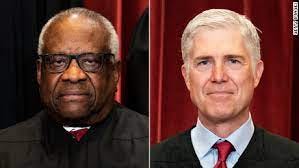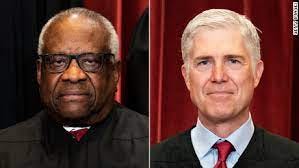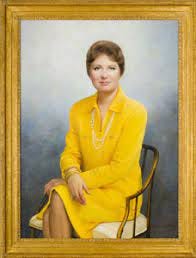A Second Justice Joins the War on the Press
Three things to know about Gorsuch's recent dissent.
Welcome to Second Rough Draft, a newsletter about journalism in our time, how it (especially its business) is evolving, and the challenges it faces.
In 2016, Donald Trump said that, if elected president, “I’m gonna open up our libel laws.” He was, and he didn’t. But earlier this month, on the day after the end of the Supreme Court term, one of the justices Trump appointed joined a campaign to do just that.
Neil Gorsuch became the second justice in two years to call for upending the libel regime that has governed American constitutional law for the last 57 years; Clarence Thomas was the first.[1] This week, I want to spotlight three things I think are worth noting about the Gorsuch dissent from the Court’s decision not to hear Berisha v. Lawson.
Gorsuch Does Not Understand How Journalism Works
Gorsuch is one of those lawyers who love to sound like they deeply understand economics, but who may be hobbled in their observations by a certain lack of experience in the real world. (Gorsuch has spent just 10 of his 54 years in private sector work, in one law firm.) So, while he correctly points out that the business model of legacy journalism is collapsing and that the rise of internet platforms has both driven this collapse and facilitated the dissemination of disinformation and misinformation, he then takes these facts and adds 2 + 2 in a way that yields 5. Disinformation, he declares is “profitable” (which is rarely true, and not, in any event, its point), while “publishing without investigation, fact-checking or editing has become the optimal legal strategy” (which is simply nonsense).
Under a legal standard like ours that punishes only knowing falsehoods, Gorsuch declaims, “ignorance is bliss.” But the actual legal rule is that journalism is most strongly protected when there is no evidence that reporters and editors published in “reckless disregard” of falsity. Cases are (and should be) costly when journalists publish something harmful to reputation that they are aware is probably false. The best way to avoid this is to amass a record that it is at least probably true.
Such fact-gathering is why investigative journalism about matters of public interest—the very sort of work the law is most designed to protect—is expensive. And it is why the cost of libel insurance for genuine investigative journalism is skyrocketing as most publishers, their businesses under pressure, retreat from the field. If Gorsuch was right, “investigative” journalism would be growing and insurance rates falling. They are not, and he is wrong.
Gorsuch and Thomas Fundamentally Don’t Agree
Thomas said in 2019 and again this month that the constitutionalized libel law put in place in New York Times Co. v. Sullivan is, in his view, entirely illegitimate, and should just be dispensed with, even after almost six decades of reliance upon it. That is, he would roll the clock in libel law back to 1963, leaving publishers vulnerable to the worst prejudices of local juries, at least in states unwilling to curb them. (The original Sullivan case was brought by white supremacist officials in Alabama objecting to an ad placed by civil rights activists, and had seriously threatened to bankrupt the New York Times, and certainly to curtail coverage of the civil rights movement.)
Gorsuch starts at a similar place—he agrees with Thomas that the Warren Court made up our modern libel law pretty much out of whole cloth—but he then essentially proposes himself (with four colleagues, if he can find them) to make up a whole new jurisprudence for the internet age, as he puts it, “a world in which everyone carries a soapbox in their hands”.
This is the farthest thing from judicial conservatism or judicial restraint; it is literally the opposite of Originalism. What Gorsuch would put in place he does not say, but, at the least, he clearly wants to constrict the range of non-official “public figures” about whom reporting is protected.
How Much of This Represents Judicial PTSD?
One thing Thomas and Gorsuch do have in common is that both suffered in the public spotlight, and may be inclined to blame the press. Thomas, credibly accused of sexual harassment at his confirmation hearing 30 years ago, referred to that as an attempted “lynching.” It is generally believed to have been a transformative moment for him.
Gorsuch’s anger at the press is less palpable than Thomas’s, or than that of the nearly unhinged screed in a March dissent from senior federal appeals court judge Laurence Silberman, but Gorsuch respectfully cites both of them. Gorsuch’s own trauma occurred even earlier, when, as a teenager, his mother was driven from her perch as head of the federal EPA in the wake of allegations that she withheld funds for purely political purposes and slow-walked the cleanup of Superfund sites. She was charged with contempt of Congress, and forced to resign when President Ronald Reagan’s lawyers refused to continue defending her. It was downhill from there.
If they are to overthrow 57 years of legal doctrine, Thomas and Gorsuch will need three other votes, and their dissents from refusals to hear libel cases suggest they do not yet have them. Chief Justice John Roberts, a solid institutionalist, seems unlikely to be sympathetic; Justice Samuel Alito may well be. That leaves Justice Amy Coney Barrett, whose views on this and many other issues remain largely unknown, and, of course, another justice who may have some PTSD of his own with respect to the press, Brett Kavanaugh— the other member of the Court elevated notwithstanding credible accusations of sexual misconduct.
Kavanaugh’s peroration at his own confirmation hearing was the most nakedly partisan and spiteful moment in the modern history of the Court. His record on the Court has often seemed an effort to walk back from that precipice. With Gorsuch now committed, and Alito likely to go along, if Barrett became a fourth vote for a judicial attack on the press, would Kavanaugh be a fifth? That may be one of the biggest legal questions of the years ahead.
[1] As Gorsuch notes, at least five justices raised questions about the current legal regime as it was evolving in the Seventies and Eighties, but, as he fails to note, this effort was essentially abandoned more than 30 years ago, when Chief Justice William Rehnquist, in a case that pitted Rev. Jerry Falwell against Larry Flynt of Hustler magazine, threw in with the doctrine that had been developing over the preceding quarter century. Gorsuch twice cites a skeptical law review article written 28 years ago by then-professor Elena Kagan, but also fails to note that Kagan declined repeated opportunities to defend that piece in her 2010 confirmation hearings for the Court.




